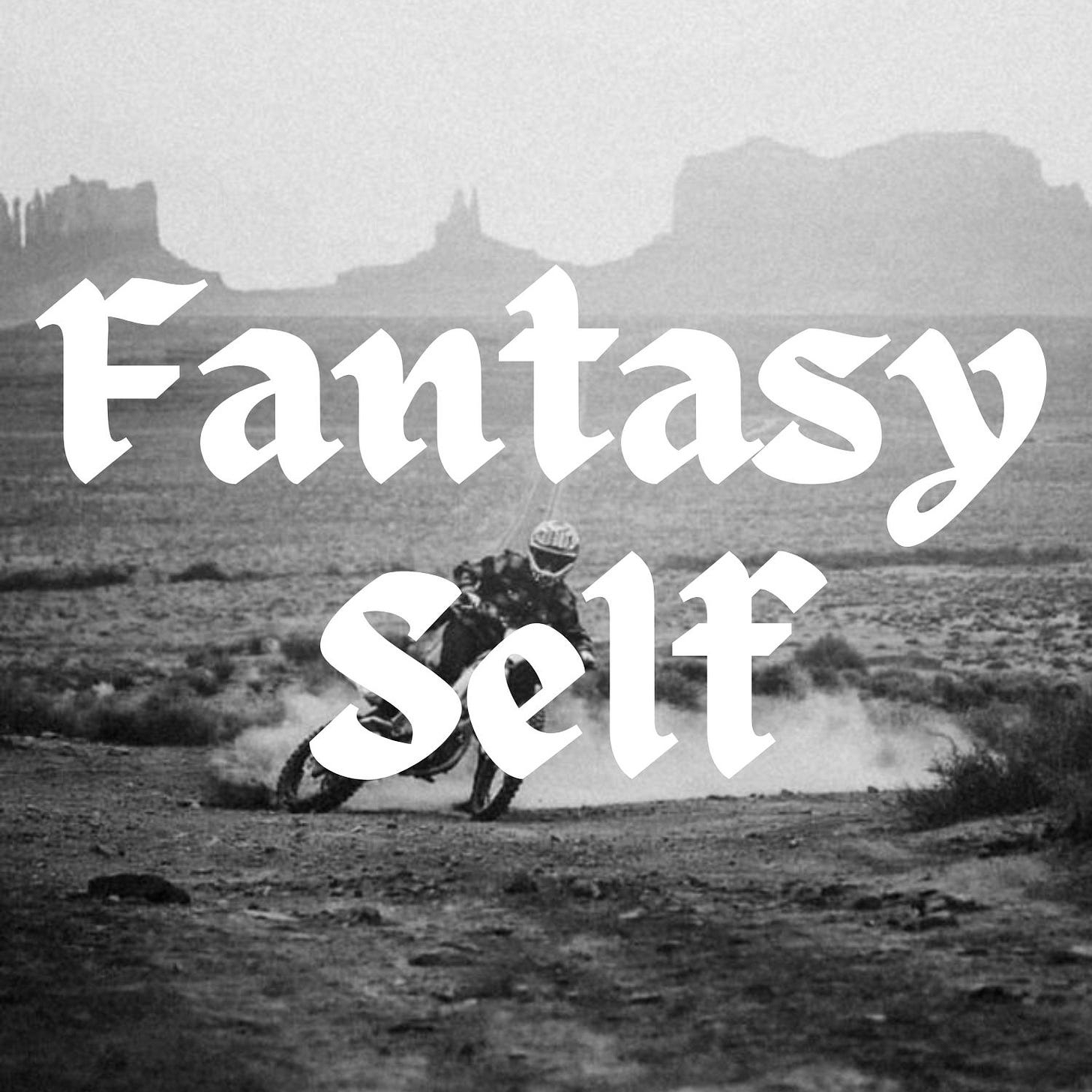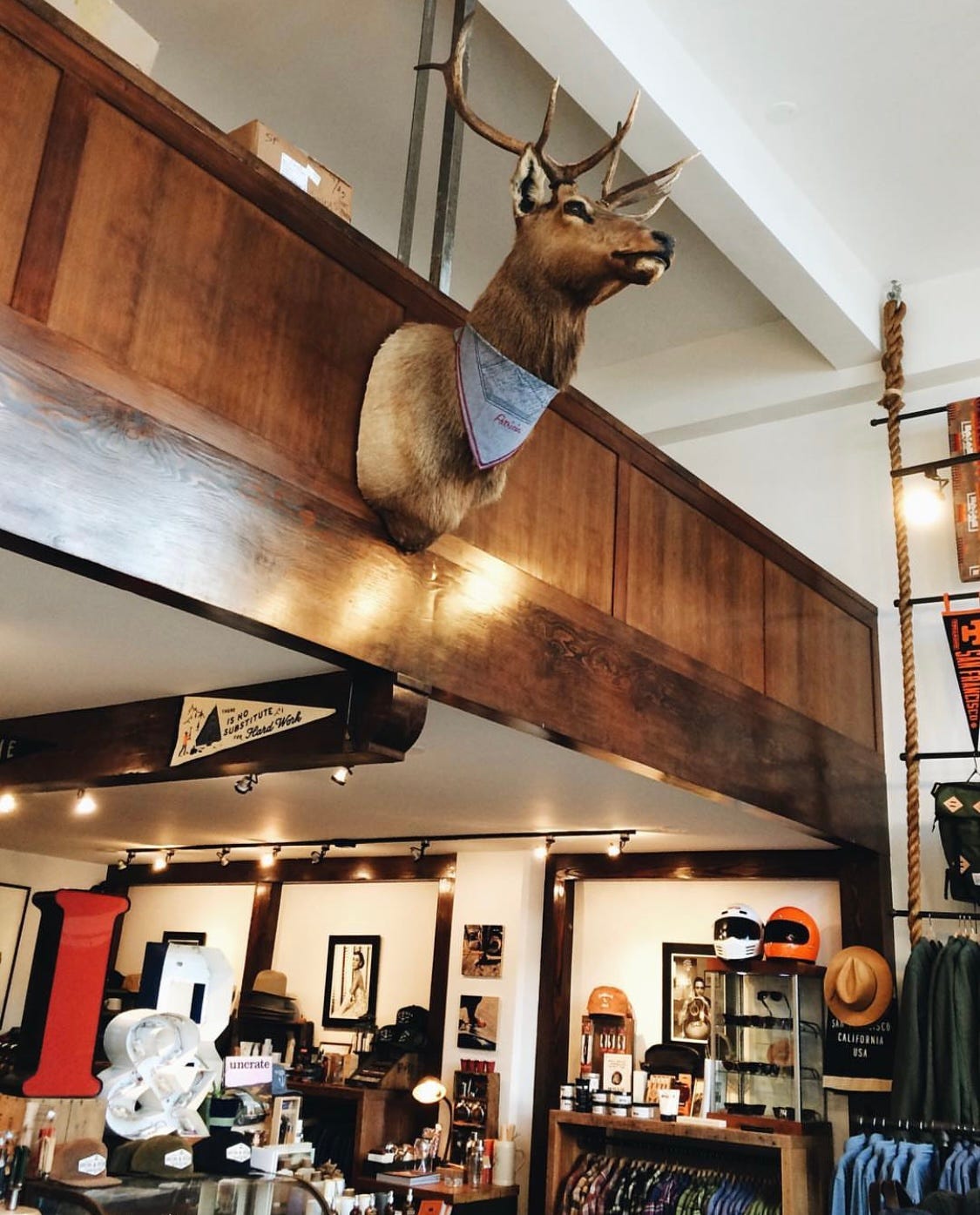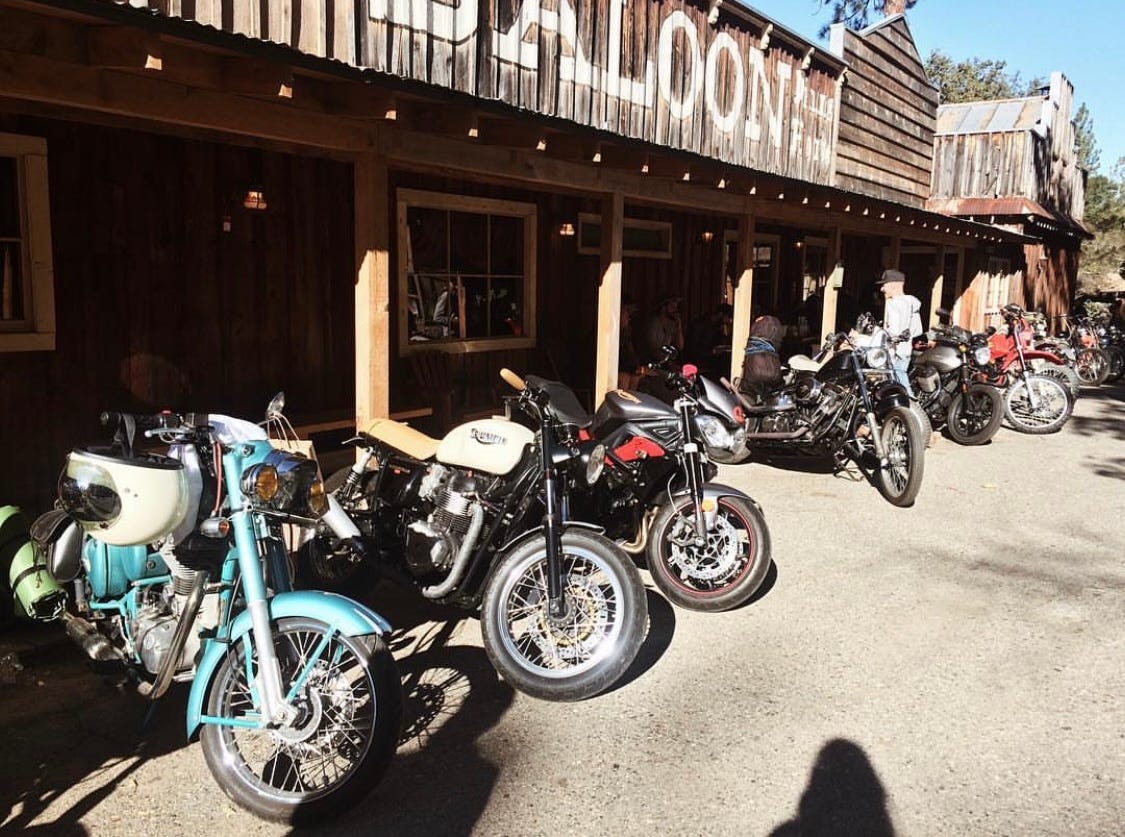Your Boyfriend Secretly Wants To Be An Outlaw
Understanding the Outlaw archetype as a glamorous ideal.
There is a man who ambles along, past the drop edge of yonder, past the limits of memory, across the wheat fields and the desert vistas and the mini-marts and the killing fields of America.
We all have felt our necks bristle from the tickle of his whiskey breath.
When he’s good, his smile feels like wearing a blanket made of stars. When he’s bad, there’s blood on his spurs and vomit on his breath. He may be our last, best, only remaining American institution.
He is the Outlaw, and he haunts this nation like the hawks haunt the interstate. And he holds special power over the men of this country. Women love him, too. He animates our deepest, most suppressed fantasies. But the Outlaw speaks to men in a specific and very powerful way. I saw this over and over when I worked for Iron and Resin, a motorcycle and surfing menswear brand based in Ventura, California.
Iron and Resin was first introduced to me by an ex-boyfriend. He loved the brand, he rode motorcycles and was learning to surf (at least in part because I did). He asked me to go with him to the opening of the INR boutique in San Francisco, on Columbus Ave, in the shadow of the TransAmerica pyramid. Of course, at the time, I liked it because he liked it. But the atmosphere was pungently evocative, like an early Lana Del Rey song or the movie Casablanca, full of references and cliches so powerful that you forget how obvious they are.
The boutique was full of framed photos from the 1970s of motorcycles and surfers, including Bruce Bown photos and Scott Toepfer’s work, too. Motorcycle helmets decorated the floating shelf above the cash register. Motorcycle jackets and waxed canvas vests were hung up on perfectly spaced hangers, in size order. It had everything a certain kind of man would need, including:
Red Wing boots and the pine pitch oil for treating them
hunting knives
deerskin motorcycle gloves
solid, all-natural cologne in aluminum cases
pannier bags
heavy brass wallet chains that could double as weapons
Wax dressing for canvas jackets
shearling jackets
Mexican surf blankets
Surf wax, the only brand anyone ever uses, Mr Zogg’s Sex Wax, the cool water version. Arranged in a pile under a framed photo of James Dean.
There were other accouterments that seemed a little bit gimmicky, like an at-home gin distillery kit. I once had to explain what a “room spray” was to a flummoxed member of a certain notorious MC. But any man who surfed, rode, or both, would find something that he not only needed but wanted at the Iron and Resin store. Their brand archetype was very clearly the Outlaw.
At the time, I was square as hell and just as shy. Still, there was something about the place that appealed to me. So when I couldn’t find a job nine months later, after graduating from college, I happened to pass by the shop again on the way to a yoga class and saw that they were hiring. I filled out an application that night and started the next week. My first day was Black Friday.
Let me tell you something, a 22-year-old strawberry blonde with a bottomless desire to please people—especially men—makes a uniquely overqualified saleswoman at Iron and Resin.
I had grown up surfing, so I could chat with anyone about local surf breaks. I trained in every brand we sold and made reference documents for as many products as I could, so I could size a man up correctly from head to toe just by looking at him. And when a customer smiled at me, I blushed, and it was completely real. (It still is, to my eternal embarrassment. If I think you’re hot, you will know, and it’s humiliating!)
The real magic came when I understood something critical about the customer base–something I thought most people had overlooked. There were plenty of guys who rode or surfed who came in for motorcycle helmets or sweatshirts, who you could tell lived the life. That was clearly the ‘target audience’ INR marketed to.
But then there were the squares, like me. The men who were searching for something beyond the products themselves: transformation.
There it is, the hot tickle of his whiskey breath. Can you feel it?
The Outlaw is glamorous and alluring precisely because he spends so much of his time languishing in our collective shadow. People don’t want to admit that he’s in there, or that they like him.
The word outlaw comes from the Viking Age, from the Old Norse útlagr, meaning “banished.” To be an outlaw is to exist literally outside the law and its protections. His freedom may be the closest one can come to absolute freedom, with a single perverse carve-out: the only place he can’t go is home. He is destined to a rootless existence unless and until his sentence ends.
His fundamentally doomed quality aside, a lot of upwardly-mobile, corporate type American men of a certain age want to be him. Most of the time they don’t even realize this consciously.
But I do.
It happened in a similar way every time. A man who worked in tech or finance, who wore Brooks Brothers khakis, would pass the store and stop to look in the window at the displays I had lovingly merchandised: a mannequin in a flannel shirt and waxed canvas vest, surrounded by tear-proof, waterproof motorcycle maps, tin camping cups, a Norwegian hatchet, an aluminum flask engraved with a Hunter S Thompson quote, a Pendleton blanket roll, a Simpson helmet, strike-anywhere matches.
Cautiously, he’d enter the store and I would greet him. Without fail, he’d look up at the gallery wall of Bruce Brown/Toepfer pictures. Something would flash in his eyes–the remnants of defiance long forgotten. Occasionally a man would stand frozen on the spot, taking in these powerful images of freedom and danger with awe, like they were Playboy centerfolds. I’d let him amble around the store for a few minutes, waiting until he picked something up before making my approach and asking if he had any questions.
“Oh, I’m not looking for anything in particular. This store is just so cool,” he would say.
“Do you ride?”
“No, but I’ve always wanted to.”
A warm smile. And then: “Well, you’ll need something to protect you from the elements when you start. That North Face vest won’t do. How about some waxed canvas?”
This happened over and over, every day. I saw it happen to countless software developers, computer engineers, bankers, private wealth managers, and a couple of Stanford epidemiology professors. You may be thinking that I’m a trickster, and you wouldn’t be wrong. I had a sales goal to meet, after all. But I was employing the help of a very specific phenomenon: glamour. These men were experiencing a projection of their Fantasy Selves.
The Outlaw, as presented by Iron and Resin, has two tickets out. He has two ways of accessing his hard-won freedom: a surfboard, or a motorcycle. The ocean, or the open road. You might think that’s an odd combination, but in California, both subcultures have existed side by side for decades. My dad (a lifelong surfer raised in Venice Beach) recalls making friends with the motorcycle gangs that liked to hang out at Neptune’s Net on afternoons. “We were both on the fringes back then,” he says. “Surfing wasn’t mainstream. They understood that.”
Of these two avenues, the motorcycle is the easier, more accessible thing. Surfing has an extremely high barrier to entry—just ask Johnny Utah. You have to tolerate fucking up over and over again. You have to have the humility to know that the ocean will always win. You need good triceps, strong shoulders, a rangy looseness about your spine. You need to like cold water.
But a motorcycle is something that almost anyone can get a license for and learn how to ride. That’s why these men were so enthralled by the idea of buying helmets when they didn’t even have motorcycles yet. The future they longed for was in reach for them–they just hadn’t realized it yet.
What I’ve often wondered in the years since is: why the Outlaw? Why do so many men my age or slightly older (millennial to young Gen X) want to be like him?
Maybe it’s something to do with how boring everything is. Maybe it’s because the burdens of American life leave little room for spontaneity. Maybe it’s because of the ambient cultural panic about masculinity (both in terms of over-identifying with it, and with disowning it. We are deep into a crisis of duality here).
Or maybe it’s because the outlaw never chooses anything, really. A steady girlfriend, marriage, children, mastering a trade, climbing the corporate ladder or even just staying afloat in a specific career–all of these choices preclude thousands of other possibilities.
That’s a terrifying thing to realize.
And if a man feels like his choices aren’t really his own, but actually decisions made for him long ago by some nebulous force he refers to as society….well, it’s not hard to see why many men my age would secretly like to rebel against making any choices at all.
The Outlaw never has to choose a single path–he goes wherever he wishes, does everything on his own time, and has nobody to compromise with or, heaven forbid, obey. When you look past the qualities that make him so attractive–his freedom, raw nerve, independence, and cunning–you see a man who lives a provisional life. He’s like Peter Pan, only he smokes Marlboro Reds and rides a Harley Davidson. Nothing in his wallet except a condom and approximately thirty dollars.
By choosing to be open to everything, he ends up with nothing. At least, nothing he can take with him. All he has is the present moment.
But this is so different from the life we know. After sitting in front of a computer all day and being anesthetized by algorithms, what could be more alluring than the full-body high of riding a motorcycle, surfing, cliff diving? Than risk, danger, daring, fecklessness? Than oblivion?
(By the way, I recognize that this longing isn’t unique to men—it’s just that I’ve seen it constellate in them literally hundreds of times, so I feel like I understand it a little better.)
We have so little tolerance for darkness in our culture, and the Outlaw is a dark, dark man. Somewhere in his murky past, he’s probably killed some people. He cannot be trusted, which is why he’s outside the fence in the first place, training his amber eyes on some unsuspecting sheep, creeping forward on his silent paws.
Who knows where his scars came from, or why he can’t go home. He’ll certainly never volunteer that information. But in his lighter aspects, he symbolizes a specific kind of freedom. Rather than freedom to do something, he is freedom from societal constraints.
Nothing is more of a siren song to men who graduated magna cum laude from Cal and now work in Chinese crisis PR, deep tech, or private wealth management for Morgan Stanley, you know? Nothing is more appealing to the man who chose the conventional path and now feels bored and empty. And by the way, if that’s you, and you’re feeling called out right now? It means I’m bang on the money, baby, because the truth always stings like nettles.
Over the course of my employment at INR, I ended up trying on the Outlaw archetype for size. Each year, INR used to hold a camp out called the Hooligan Hoedown. It always had one or two alcohol sponsors and live music from local bands. People would ride or drive out from all over California. The first year, it was on the central coast, near one of those barn-type places that’s now used for “rustic chic” weddings. I drove out and camped out alone. I smoked my first and only cigarette. As an employee, I didn’t pay for alcohol, so I also experienced my first hangover. The sunrise was as red as the flesh of a Sicilian orange, and I was awake to watch it, pounding head and all.
The following year, the Hoedown moved to Bandittown, deep in the foothills of the Eastern Sierras. I was giving the sound guy a ride, an extremely affable, very tall man in his forties named Ben. As Ben and I were driving, we kept passing the group that was riding out together from the store. There were about thirty men, riding two abreast in the HOV lane, on their Harleys and Triumphs and Royal Enfields. The deep, menacing rumble of the engines made the hair on the back of my neck stand up.
There he is, right behind you. Is he baring his teeth, or is he just smiling? Difficult to tell sometimes.
There are few images as powerful to me as that memory. It is as real in my body as old shrapnel.
Ben and I became fast friends, both from SoCal, both loving the same bands. Later on in the night, he came and found me in the chaos, with everyone dancing. I was standing in the corner, shyly gripping the neck of an 805. He cupped my face in his hands with a big smile.
“Honey, I’m so happy I met you,” he said, and it was all he said. I smiled back, full of warmth. A moment later, he was gone. I went to talk to the guy who had the flashy custom paint job on his Royal Enfields.
The Outlaw teaches us that we only ever borrow people.
Connections melt like snow.
All of it is temporary.
People die, sometimes violently, sometimes with excruciating slowness. Stability, permanence, safety, love, health, belonging, community, comfort–these are all soluble. You cannot rely on any of them. They will always fail you at some point. The Outlaw teaches us that there’s a time and a place to slip beyond the bounds of what is proper and expected—because seasons of chaos, alienation, and loneliness will happen anyway.
His freedom is ultimately an illusion.
But, maybe, so are the things he rebels against.






